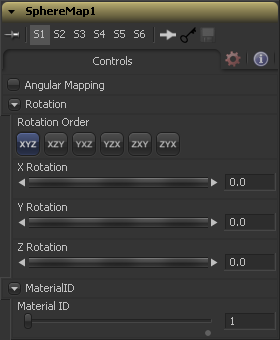Eyeon:Manual/Fusion 6/Sphere Map
From VFXPedia
[ Main Manual Page ]
The SphereMap tool allows the creation of a spherical texture map from an image. The input image should represent the texture information
in a longitude/latitude format, where the x axis represents 0-360 degrees longitude and the y axis represents -90 to +90 degrees latitude.
The tool expects an image with an aspect ratio of 2:1. Otherwise the image is clamped according to the following rules:
- 2 * width > height
- The width is fit onto the sphere and the poles will display clamped edges.
- 2 * width < height
- The height is fit onto the sphere and there will be clamping about the 0 degree longitude line.
External Inputs
- SphereMap.ImageImage
- [ white, required ] Receives the RGBA channels from an image output
Controls
Adjusts the texture coordinate mapping so the poles are less squashed and areas in the texture get mapped to equal areas on the sphere. In other words, it turns the mapping of the latitude lines from a hemispherical fisheye to an angular fisheye. This mapping attempts to preserve area and makes it easier to paint on or modify a spheremap since the image is not as compressed at the poles.
Offers controls to rotate the texture map.
This slider sets the numeric identifier assigned to this material. This value will be rendered into the MatID auxiliary channel if the according option is enabled in the renderer.
Tips for Sphere Map (edit)
Sphere Map vs. Connecting the texture to a Sphere directly
You can connect a latlong (equirectangular) texture map (see http://wiki.panotools.org/Equirectangular) directly to a sphere instead of piping it through the Sphere Map tool first. This results in a different rendering if you set the start/end angle and latitude to less than 360°/180°. In the first case, the texture will be squashed. When using the Sphere Map tool, the texture will be cropped. Compare:
(Note: If you pipe the texture directly into the sphere, it will also be mirrored horizontally. You can "fix" this by using a Transform tool first.)
| The contents of this page are copyright by eyeon Software. |



